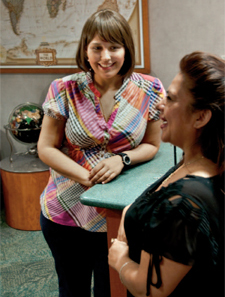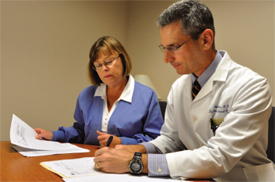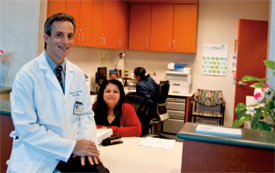Removing barriers, easing transitions

Each morning, Elsa Lopez-Andrade walks into the kitchen to make breakfast. Generally, the menu includes fried eggs, waffles or cereal and a hefty portion of fresh fruit.
It’s a task she performs every day, but this meal is taking place 730 miles from her home in Mexico, while she is in Houston for treatment at MD Anderson with assistance from the International Center (IC).
For patients like Lopez-Andrade, who are diagnosed with cancer abroad, the IC is hope on the horizon. Designed to remove barriers and ease the transition for international patients seeking medical care at MD Anderson, the center helps about 1,100 people each year, or 3% to 4% of all new patients.
“Patients have a lot of hope that our expertise and specialists can provide them with the best advice in the world,” says Martha Coleman, nurse manager in the IC. “It’s a center whose mission is, quite literally, bigger than itself.”
An unsettling diagnosis

Elsa Lopez-Andrade (left), who is being treated for sarcoma,
visits with Hanna Palomino, the bilingual international
patient assistant helping her navigate MD Anderson and Houston.
Photo: Erin McCormick
Hailing from Veracruz, Mexico, a port city on the palm-fringed Gulf of Mexico, Lopez-Andrade never imagined she would one day board a plane with her health, and quite possibly her life, hanging in the balance.
“It began when I noticed a problem with my leg,” she says. “It always felt very tense and since one of my legs is a little longer than the other, I thought I should go to an orthopedist.”
Lopez-Andrade made her way to a local doctor to have a series of diagnostic X-rays. What was discovered made her heart sink — little shaded spots, as they appear on film, often signaling a tumor or area of abnormal growth.
She was immediately referred to a hospital in Mexico City for further evaluations, which confirmed the worst: a soft-tissue sarcoma, which had spread to her lungs.
“It came as a complete shock,” she says. “When you think about cancer, you automatically think the worst.”
Gateway to hope
Diagnosis in hand and with the help of her family, Lopez-Andrade took on the mission of finding the best place for care.
“My husband sent a mass e-mail to people at work, including the company’s offices in the United States, asking for suggestions,” she says. The answer was clear and three weeks later, her cancer journey in Houston began.
Before beginning treatment, Lopez-Andrade arrived at MD Anderson for a week-long visit to begin the formal registration process.
That’s when she met Hanna Palomino, one of eight international patient assistants, who would guide her through the entire appointment and treatment process. Patients entering the center are assigned a representative who is fluent in their languages and cultures. The IC and Language Assistance provide support for speakers of Arabic, Turkish, Spanish, Mandarin Chinese, German, Italian, Russian, Portuguese, Swedish, Vietnamese and French.
“When a patient calls, I explain to them that this is a process, and I will be there every step of the way,” Palomino says. “It’s amazing, because when patients arrive, they are nervous and scared but so grateful to have someone who can explain all the procedures in their own language.”
Palomino helped Lopez-Andrade schedule appointments, fill out paperwork, learn about the center and did so in a way that seemed so efficient and easy she could have been in Mexico City.
With a confirmed diagnosis, Lopez-Andrade entered MD Anderson’s sarcoma clinic.
“I was put on a 21-day chemotherapy cycle and thought it was going to be worse, but it wasn’t,” she says.
International Center adds a personal touch
A motto described by Coleman as “do for the patient” underscores the significance of MD Anderson’s global role in cancer care. To this end, the IC offers services, including assistance with lodging, transportation, visas and insurance to make the
journey as easy as possible.

Martha Coleman, nurse manager of the International Center, and Daniel Epner, M.D.,
associate professor and clinical medical director of the IC, assess the needs of an
international patient. Photo: Gini Reed
The IC works closely with patients to ensure they are granted entrance to the United States. “We provide a medical appointment letter to home governments or embassies to indicate that a patient is scheduled for evaluation and to expedite any necessary approvals,” Palomino says.
Part of this foreign relations role is to provide accurate follow-up care when a patient returns home. A complementary DVD — containing treatment plans, pathology reports and diagnostic imaging, as well as reports from the physician on the diagnosis — is available via myMDAnderson (each patient’s individual website). This provides presenting community physicians with a complete patient history.
Another service extends beyond MD Anderson’s walls, ensuring that patients have access to comfortable living arrangements.
The IC provides a list of local hotel accommodations, which can be prearranged at a discounted price and fit the needs of cancer patients. Lopez-Andrade took advantage of this service, but later decided to rent an apartment for a better sense of “home.”
In addition, the IC helped her obtain car insurance, so Lopez-Andrade could use her own Honda to travel to and from appointments.
“I had so many questions about what is normal,” she says. “I made a big list for Hanna.”
While this question list is an important one, the significance lies in the very fact that she had someone to ask. Without the IC’s dedication to serving diverse populations, Lopez-Andrade would undoubtedly have faced steeper challenges, in addition to the cancer. Her experience is similar to that of many other international patients, who are grateful that the IC provides a slice of familiarity at a time when it’s needed most.
“The kind of work that we do at such a vulnerable time in someone’s life is a huge honor,” Coleman says. “To show the compassionate and caring side of MD Anderson to the world is very rewarding.”’
Cultural Competence in a Clinical Setting
While the International Center (IC) provides patients with the logistical, administrative and representative services, the clinical component of the journey for some begins in the International Cancer Assessment Center (ICAC). Here, patients missing necessary tissue diagnostics or staging studies are evaluated and triaged to the appropriate clinic, depending on their needs.

Michael Fisch, M.D., associate professor and chair of the Department of General
Oncology, oversees the International Cancer Assessment Center. Celia Garcia
is a patient access specialist in the center.
Photo: Gini Reed
“International patients face a common existential crisis regarding the life-threatening nature of cancer, but they also encounter new customs and languages,” says Daniel Epner, M.D., associate professor in the Department of General Oncology and clinical medical director of the IC. “Staff members in the ICAC help patients acclimate to these changes and formulate their plan of care.”
One of the main benefits of the center is that it sets the stage for the institution’s multidisciplinary care. For these patients, the opportunity to be evaluated by a team of experts, along with MD Anderson’s strong reputation and cutting-edge technologies, are a major draw.
“We spend a great deal of time preparing patients for their future visits with the subspecialists they will see,” Epner says.
In addition, the clinical environment relies heavily on solid communications skills, which impacts how patients and physicians work together. The key to “cultural competence” is to be totally patient-centered and highly adaptive to each person, rather than focusing on preconceived notions, Epner says.
In the end, the thread that connects the IC with its clinical partner, the ICAC, is a deep devotion to patients, families and the mission to provide expert care.
“Caring for international patients is tremendously gratifying because they’re so far removed from their routine and disconnected from their support systems,” says Michael Fisch, M.D., associate professor and chair of the Department of General Oncology. “These patients are comforted by our compassionate, authentic and accessible staff.”












